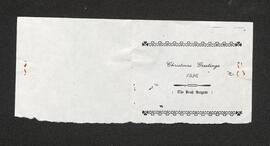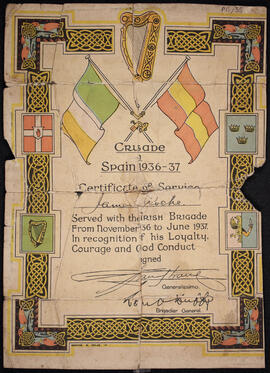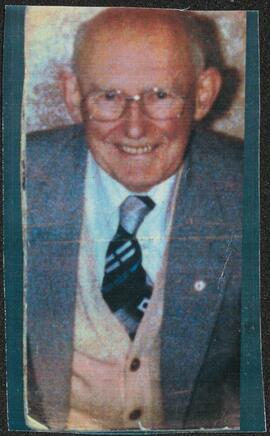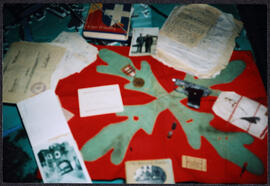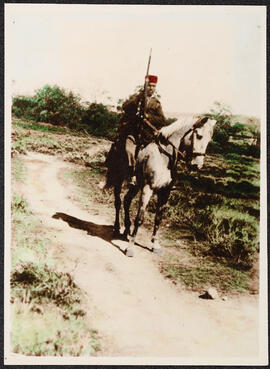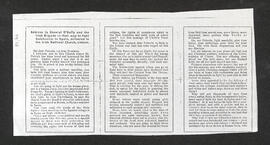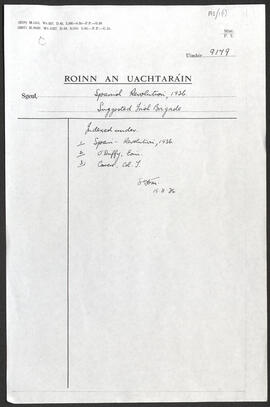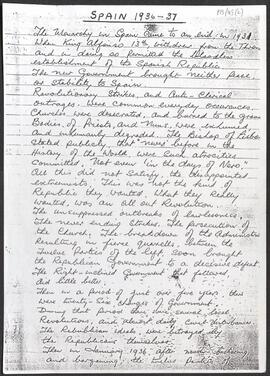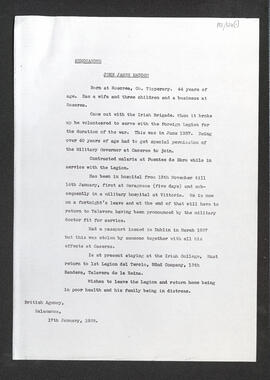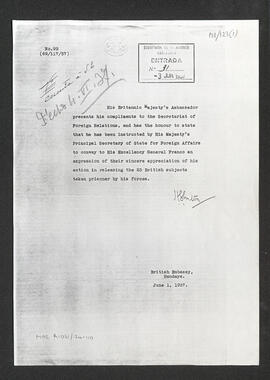An Irish Brigade Christmas card from Matthew Beckett, on board the S.S. Ardeola, Yeoward Line Cruises at Lisbon, to ‘Bill’.
Stradling, Robert Arthur, scholarCertificate of service for Crusade in Spain 1936-1937 for James Roche, Bandon, county Cork who served as medic with Irish Brigade from November 1936 to June 1937, in recognition of his loyalty, courage and good conduct. Signed by General Franco and General O’Duffy.
Stradling, Robert Arthur, scholarColour photocopy of a photograph of Matthew Beckett in Westport, county Mayo, with annotation on back saying ‘Matthew J. Beckett. Westport 1914-91.’
Stradling, Robert Arthur, scholarColour photograph of Matthew Beckett’s collection of Spanish Civil War memorabilia, including letters, a medal, a pistol, photographs and a book by Eoin O’Duffy, with annotation on back saying ‘1994 Daddy’s mem. Spanish Civil War 36/39’.
Stradling, Robert Arthur, scholarColour print of a member of the Moorish Guard and his steed on the Jarama Front. Also see P13/1/2/2/2.
Stradling, Robert Arthur, scholarCopy of the address to General O’Duffy and the Irish Brigade on their way to fight ‘Bolshevism in Spain’, delivered in the Irish National Church, Lisbon, Portugal.
Stradling, Robert Arthur, scholarMostly photocopies of official letters from Department of President, Pádraig Quinn of Kilkenny Blueshirt Division, and brothers John C. Dunphy, J. J. Dunphy and P. L. Dunphy, also involved in recruitment in the Kilkenny-Carlow area, referring to the establishment of an Irish Brigade, the delay of departure of Irish Brigade for Spain, and articles necessary for each volunteer. Includes copy of a letter from Pádraig Quinn, Kilkenny Blueshirt Division (League of Youth), Gowran House, Gowran, county Kilkenny, to Joe Duffy, regarding the question of an Irish Brigade going to Spain, noting his wish to be a member of such an organisation when the time comes, and stating ‘A number of Blueshirts here and there throughout the counties of Carlow and Kilkenny have volunteered their services for the “Irish Brigade” to Spain, the motive of such service being for the “GLORY OF GOD and the HONOUR OF IRELAND”’ (22 September 1936). Also contains copy of a letter from Padraig Quinn, Gowran House, to Joe Doyle, which reassures him that they should not be upset by men withdrawing their names from membership of Brigade (23 October 1936). In addition, a copy of a letter to Doyle from John C. Dunphy, 52 Tullow Street, Carlow, who states ‘I am instructed by Capt. Quinn, who was himself instructed by General O’Duffy, to request that you… procure a passport immediately, for all European countries. Do not mention Spain. If you choose, say you are going to a job somewhere’ (18 November 1936). Also contains list of articles necessary for each volunteer which includes one small valise, one heavy overcoat, one pair of breeches, one pair of heavy nailed boots (or shoes), three pairs of heavy socks (hand knit if possible), one spare set of heavy underwear, one leather strap strong (over 42” long), one pouch (for ammunition) and one shaving outfit.
Stradling, Robert Arthur, scholarHandwritten letter from historian Des Ryan, Moyross, county Limerick to Robert Stradling, enclosing a photocopy of the handwritten memoirs of Maurice Fennell of Rathkeale county Limerick, former Legionnaire of ‘C’ Company of Irish Brigade. The memoirs, entitled SPAIN 1936-1937 begin with the line ‘The Monarchy in Spain came to an end in 1931’ and record Fennell's view of the history of the Spanish Republic, noting ‘The new Government brought neither peace, or stability to Spain. Revolutionary strikes, and anti-clerical outrages, were common everyday occurances, churches were desecrated, and burned to the ground. Bodies of Priests, and Nuns, were exhumed, and inhumanly degraded’. The years leading to the civil war were marked by ‘twenty-six changes of Government… several local Revolutions, and almost daily civil disturbances’, the formation of The Popular Front, outbreak of Spanish Civil War in 1936, and the Irish response stating ‘Due to our historic ties with Spain, and a strong Anti-Communist emotion, which was now engulfing the entire nation, North and South, General O’Duffy had little difficulty in recruiting an Irish Brigade, to fight for Christianity, and Spain, and in an indirect way, for Ireland’. Also notes the passing of the Non-intervention Bill, members of Irish Brigade including many old Irish Republican Army and ex-army officers, setting off for Spain on board the Dun Aengus during stormy weather, stating ‘The storm was still blowing, and the rain pouring down, no food, no sleep, no water, and very little hope. Despair was clearly visible on every face’, and rescue by a German grain boat, stating ‘They then left down a number of wooden ladders tied together, and eventually they were made fast to the rail of the Dun Aengus. However it was like climbing on to a “bucking bronco”. The difference was, that if you lost your grip, or made one slip, you were catapulted into eternity, via the freezing, turbulent, awesome, waves of the Atlantic Ocean’. Also records experiences of Salamanca, stating ‘The huge square was bedecked with beautiful flowers, buntings, and Irish and Spanish flags. The hundred or so tables were attended by charming Signorettes in Native Costume and the food was sumptuous, or so it seemed… after almost seven days of starvation’, and training at Cáceres where he notes ‘Our individual training was carried out in the big Military Barracks… Just outside the back wall, there was a sand-bag embankment… We later learned that it was a shooting range of a different kind. It was here that Red Troops, who were tried, and found guilty, of certain crimes, were executed. It was not a nice sight, I went to see it once, and that was enough’, the daily routine, mass at Church of San Domingo, journey to the Madrid Front and attack by ‘friendly troops’, stating ‘It is amazing how quickly one adjusts to the circumstances, in a situation such as this, one’s fears, and forebodings, seem to vanish and instead there is a feeling of elation, having beaten the defending backs, and sees the line at his mercy, in the dying moments of a Rugby Match’, the atrocities, attacks by ‘the Reds’, mining a railway used by ‘the Reds’, and the final journey home, stating, ‘Our Crusade was ended. We may not have had any great effect on the outcome of the War, but we played our part, to the Best of our ability… it is no small consideration to know that we were on the winning side, and that in so doing we repaid, in a small way at least, part of our long-standing debt to Spain.’ Paginated.
Stradling, Robert Arthur, scholarMainly photocopies of letters to the Spanish Ministry of Foreign Affairs and Ministry of Defence including correspondence with Irish Legation in Spain, Madrid, the British Agency in Spain, Salamanca, and with Juan Yagüe, Chief-General of Spanish Legion, referring to demobilisation of Irish Nationalist volunteer, John James Madden, of Roscrea, county Tipperary, due to ill-health.
Stradling, Robert Arthur, scholarMainly photocopies of correspondence between the Spanish Ministry of Foreign Affairs and General Espinosa De Los Monteros, Sub-secretary of Ministry of Foreign Affairs (Nationalist Zone), L.H. Kerney, Irish Minister of Irish Legation to Spain in San Sebastian, and [H. Shilton] of the British Embassy to Spain in Hendaye, addressing a number of issues including Irish prisoners of war in Spain such as International Brigadiers, Frank Ryan and Andrew Delaney, the death in action of Irish Nationalist volunteers such as Austin O’Reilly and Daithí V. Higgins, and the issue of desertion charges against Irish nationalist volunteer, Andrew O’Toole.
Stradling, Robert Arthur, scholar